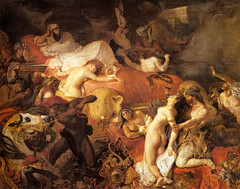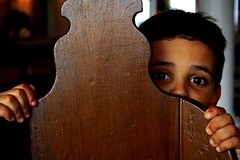| 5694291214 | Affable | Pleasantly easy to approach and to talk to; friendly; cordinal; warmly polite |  | 0 |
| 5694305092 | Aloof | At a distance, especially in feeling or interest; apart; reserved or reticent; indifferent; disinterested |  | 1 |
| 5695276398 | Ambiguity | Deliberately suggesting two or more different, and sometimes conflicting, meaning in a work. An event or situation that may be interpreted in more than one way- this is done on purpose by the author, when it is not done on purpose, it is vagueness, and detracts form the work. |  | 2 |
| 5695311416 | Aporia | An irresolvable internal contradiction or logical disjunction in a text, argument, or theory |  | 3 |
| 5695330129 | Assonance | The repetition of similar vowel sounds followed by different consonant sounds especially in words that are together. |  | 4 |
| 5695347146 | Bildungsroman | A type of novel concerned with the education, development, and maturing or a young protagonist |  | 5 |
| 5695360959 | Caesura | A pause near the middle of a line; a break between words within a metric foot |  | 6 |
| 5695388082 | Dialect | A way of speaking that is characteristic of a certain social group or of the inhabitants of a certain geographical area. |  | 7 |
| 5695405960 | Diction | A speaker or writer's choice of words |  | 8 |
| 5695411836 | Empathetic | Showing an ability to understand and share the feelings of another |  | 9 |
| 5695419358 | Epistolary | (of a novel or other work) constructed in a form of a series of letters |  | 10 |
| 5695431081 | Enervated | Without vigor, force, or strength; languid |  | 11 |
| 5695439212 | Fable | A very short story told in prose or poetry that teaches a practical lesson about how to succeed in life |  | 12 |
| 5695451638 | Folklore | The traditional beliefs, myths, tales and practices of people which have been disseminated in an informal manner |  | 13 |
| 5695515064 | Foreshadow | The use of hints and clues to suggest what will happen later in a plot |  | 14 |
| 5695524441 | Gothic | Noting or pertaining to a style of literature characterized by a gloomy setting, grotesque, mysterious, or violent events, and an atmosphere of degeneration and decay |  | 15 |
| 5695551040 | Hyperbole | A figure of speech that uses an incredible exaggeration or overstatement, for effect |  | 16 |
| 5695567470 | Irony | a discrepancy between appearances and reality |  | 17 |
| 5695572203 | Morid | Characterized by an abnormal and unhealthy interest in disturbing and unpleasant subjects especially death and disease |  | 18 |
| 5695586150 | Paradox | A statement that appears self-contradictory, but that reveals a kind of truth |  | 19 |
| 5695599133 | Penitent | Feeling of showing sorrow and regret for having done wrong; repentant |  | 20 |
| 5695848813 | Pensive | Engaged in, involving, or reflecting deep or serious thought |  | 21 |
| 5695613565 | Personification | A figure of speech in which an object or animal is given human feelings, thoughts, or attitudes |  | 22 |
| 5695627664 | Polysyndeton | Sentence which uses a conjunction with NO commas to separate the items in a series. Instead of X, Y, and Z...This results in X and Y and Z...Kurt Vonnegut uses this device |  | 23 |
| 5695670915 | Recondite | dealing with very profound, difficult, or abstruse subject matter |  | 24 |
| 5695678912 | Renaissance | The activity, spirit, or time of the great revival of art, literature, and learning in Europe beginning in the 14th century and extending to the 17th century, marking the transition form the medieval to the modern world |  | 25 |
| 5695707455 | Riled | To make (someone) annoyed or irritated |  | 26 |
| 5695719345 | Romanticism | A revolt against Rationalism (the thought of using reason rather than relying on the authority of the past, on the authority of the Church, or an institution) that affected literature and the other arts, beginning in the late 18th century and remaining strong throughout most of the 19th century |  | 27 |
| 5695744519 | Satire | A type of writing that ridicules the shortcomings of people or institutions in an attempt to bring about a change |  | 28 |
| 5695760028 | Soliloquy | A long speech made by a character in a play while no other characters are on stage |  | 29 |
| 5695774538 | Theme | The insight about human life that is revealed in a literary work |  | 30 |
| 5695781718 | Timorous | Showing or suffering form nervousness or a lack of confidence |  | 31 |
| 5695899497 | Tone | The attitude a writer takes toward the subject of a work, the characters in it, or the audience, revealed through diction, figurative language, and organization |  | 32 |
| 5695923611 | Verisimilitude | The quality of appearing to be true, real, likely or probable |  | 33 |
AP Vocabulary Study Guide Flashcards
Primary tabs
Need Help?
We hope your visit has been a productive one. If you're having any problems, or would like to give some feedback, we'd love to hear from you.
For general help, questions, and suggestions, try our dedicated support forums.
If you need to contact the Course-Notes.Org web experience team, please use our contact form.
Need Notes?
While we strive to provide the most comprehensive notes for as many high school textbooks as possible, there are certainly going to be some that we miss. Drop us a note and let us know which textbooks you need. Be sure to include which edition of the textbook you are using! If we see enough demand, we'll do whatever we can to get those notes up on the site for you!

